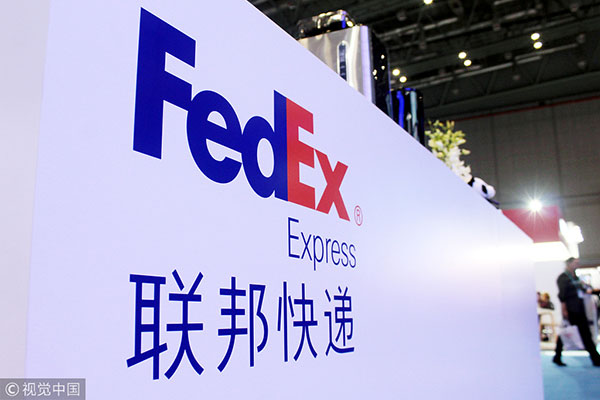FedEx: Competition good for innovation
China Daily Updated: May 24, 2019

Please use three words to describe China's changes in the past 40 years.
Innovation - from "made-in-China" to "innovate-in-China".
Collaboration - an open market has given birth to lots of international cooperation.
Positive influence - China's growth has a profound impact on the world.
What are the biggest achievements FedEx has made in China so far?
The rapid growth of the express industry in China is amazing and remarkable. In the past 34 years, FedEx has benefited from China's rapid economic growth and open policies.
FedEx began to provide services in the Chinese mainland in 1984. It became the first express carrier to be linked electronically with China Customs in 1994. In 1996, FedEx began to operate a United States-China all-cargo route, which was the first connecting the two nations. The company began to fly its own aircraft to serve the China market in the same year. In 2007, FedEx announced domestic services in China and became a wholly foreign-owned enterprise in China.
Currently, FedEx has 84 branch offices and more than 100 stations in China, with more than 2,800 vehicles and over 10,000 employees. We have more than 250 flights a week, which cover most cities and regions in the country. FedEx is the express carrier with the highest volume of flights serving the market.
What's the biggest challenge China faces today and how can the country overcome it?
Within logistics, specifically for the express industry, there's the challenge of how we can help more Chinese enterprises win in the global economy. As the world is becoming more connected, many enterprises understand the huge potential business value behind going global, but they need help making the process more efficient and reliable. They need to know how to circumvent risk in terms of supply chain management.
Nowadays, more than 98 percent of Chinese businesses are small and medium-sized enterprises, which contribute 60 percent of China's GDP and represent 80 percent of domestic employment. That said, they are fragile and easily influenced by global competition, which means that reliable inbound and outbound express services are essential.
To meet the logistics challenge, a well-established value chain and robust ecosystem are essential. We suggest continually sharing best practice, accelerating processes and deploying nascent technology into the supply chain. At Fed-Ex, we make sure we are dynamic and flexible enough to provide a full range of portfolios, which accommodate multiple customer needs in the rapidly changing world, so that our customers can be more competitive in the global market.
How has your company benefited from China's reform and opening-up policy?
Since the beginning of reform and opening-up, China's economic development has made a leap, which provides broader market opportunities for almost all business sectors. At FedEx, we are expanding our business operations and consistently evolving our service so that customers can be globally competitive.
For instance, we have made a series of strategic moves, including investing in the Fed-Ex Shanghai International Express and Cargo Hub, enhancing our global network and utilizing advanced technology to improve the customer experience.
A global player like FedEx benefits from the growth of business volume as a result of the policy - more and more Chinese customers are emerging on the global stage and seeking reliable logistics services to help them streamline their supply chain process and win over customers.
We have enjoyed the rapid development of China's cross border e-commerce, and we believe it will go deeper and further. As such, FedEx has comprehensive e-commerce services. Just recently, we launched an e-commerce logistics solution called FedEx Delivery Manager. The new interactive e-commerce delivery solution allows retailers to provide extra flexibility to their residential customers by letting them customize the schedule and location of their deliveries at no extra cost.
Has competition intensified between your company and Chinese companies?
FedEx has always thought that competition is good for economic growth, sustainability and innovation. If there is no competition in the market, it is difficult to develop and improve. Good competition will help us to better examine our business ability and improve our service levels. As such, FedEx has always welcomed all parties to play a competitive role under fair and equitable conditions.
How do you view China's role in the world today?
China plays an important role in the world economy by facilitating globalization and an open economy, which brings growth opportunities to a company like FedEx. For instance, the Belt and Road Initiative not only breaks the slow recovery of the world economy by connecting and integrating policies, facilities, trade, capital and the people, it also allows us to tap into our ability to grow with worldwide customers' needs, as our network covers almost all the economies related to the Belt & Road Initiative.
What measures are needed if China wants to deepen reforms?
We are looking for an even more open investment environment. FedEx is committed to long-term development in China. We continuously invest in China to respond to customers' needs and meet long-term demand in the region.
Our newly established Fed-Ex Shanghai International Express and Cargo Hub serves as an example of our commitment. It enhances Shanghai's position as an international shipping and cargo transportation center.
From the logistics industry's perspective, we are happy to see positive progress in recent years. At the same time, we look forward to more coordinated cross-departmental policy measures to address some of the long-standing industry issues, such as vehicles' city access. We also look forward to more prudent and accommodative regulatory practices that support the continued development of the industry, maintain efficient operations, and improve standards to realize higher-quality growth.
![]()





